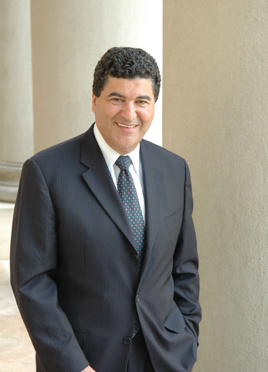| |
 |
|
|
|
|
| |
NIH director Dr. Elias Zerhouni will step down by month’s end. |
|
Zerhouni said he notified President Bush several weeks prior to Sept. 24 that he would be leaving. “I always
said that I’d end my tenure at about this time. He was completely supportive and understands.”
Zerhouni emphasized that there “was no precipitating
event—I am just stepping down at the right time.” He didn’t characterize his decision
as a resignation. He told reporters, “I don’t have a job lined up,” then joked, “I am looking for the unemployment office.”
He said, “I want to take some time out” for thinking and writing. Addressing rumors that he might be in line to take over the presidency of Johns Hopkins University, he reiterated that he has no immediate plans.
Asked what kind of writing he would do, he said, “This is a time of real transition in science and I don’t think most people understand that. The speed of changes taking place in health care and in research is remarkable. I want to share my experiences at NIH. It might help the public debate on health care and on science in general.”
Primarily, Zerhouni expressed gratitude about the opportunity to serve NIH; his email note to employees was titled “Message of Appreciation.”
As his 50-minute teleconference wound down, he told reporters, “I feel very privileged to have led this agency.” He recounted arriving in the United States with little money and virtually
no contacts. “I was an immigrant, with no friends…It is a testimony to the greatness of this country that I have been able to [become director of NIH]. I am grateful to be able to pay back, through public service, the opportunities that were offered to me.”
He credited “an extraordinary staff of researchers
at NIH, all committed to the good of all of us. And the grantee community, especially, never
failed to serve the NIH. I can count on the fingers of only one hand the number of times I have been turned down when I asked them for help. Through everything, despite thick and thin, the scientific community sticks together.”
Zerhouni divided his 6½-year tenure in thirds. The first 2 years he called “euphoric. It was a terrific time of big budgets.” The middle 2 years, he said, “were the worst—I had to explain why the money wasn’t there. Then we also had congressional
scrutiny, conflict of interest and other
controversial issues. We had twice as many grant applications, and twice as many grantees, in an era of flat budgets. Public access was also a challenge. But I still think we managed to fund the best science by the best scientists.”
 |
| Zerhouni, earlier this year, after receiving the medal of the Légion d’honneur (French National Order of the Legion of Honor), the highest decoration in France |
The final 2 years felt like vindication to an embattled director. The NIH Reform Act was passed in 2006, and institutionalized many of Zerhouni’s ideas. “These were years of consolidation,”
he said, adding that he is proud, during his tenure, to have named “a large number of new institute directors, who are terrific.
“My only regret,” he said, “is that we had so many economic challenges, with budget deficits and war. We only lost about 10 percent of our purchasing power, in real terms, which is not as bad as it could have been.” He described NIH as “well-positioned. We enjoy tremendous support in Congress.”
He is especially proud that, in 2007, NIH earned its first supplemental budget from Congress,
an $800 million addition to support the NIH Roadmap for Medical Research.
Prior to taking questions from reporters, Zerhouni
briefly recapped highlights of a directorship
that began in May 2002, when he arrived at NIH after leaving a top administrative post at Johns Hopkins.
Inheriting the angst of the post-doubling period,
he realized that “our traditional organizational
structure was not necessarily aligned with the way science was moving.” He took action to remove barriers to scientific progress “and to make it easier to work on trans-NIH issues.
“Probably my top concern was the number of young and new investigators,” he said. Anxious
to promote early independence in research careers, he recounted the Pioneer and New Innovator grants as means to support early-stage scientists. As of 2007, some 1,600 young scientists have been supported via new mechanisms,
he said.
“Twenty-five percent of the total number of new grants now support early-career scientists, and I’m very proud of that,” he said.
He is also gratified that “NIH puts science, facts and data ahead of politics and ideology…I am really confident that it is in good hands, with very capable leaders. NIH is truly the crown jewel, not just of federal government, but of the world.” 